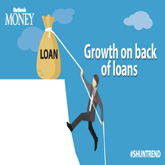Going by the data shared by the government, the Indian economy expanded 5.7 per cent year-on-year in the second quarter of 2017, which is below the 6.1 per cent in the previous period and much lower than the market expectation of 6.6 per cent. Those who love to dig deeper into data; this is the weakest growth rate since the first quarter of 2014. Yet, if you look around there is growth in the sales of vehicles, airports are crowded with passengers and despite the GST, I don’t see restaurants shutting or running thin – try booking a table for the weekends to test it for yourself.
In the past one year, despite the note ban and then the introduction of GST, which were causes of concern, sales of consumer goods shot up. Suddenly, people had money to spend. Yes, the government also helped by giving more to its employees by way of the 7th Pay Commission payout. There is plenty of data to indicate the shift from physical assets like gold and real estate to equities and other forms of investments. The entire rise in the SIP volumes of equity mutual funds indicates how people are shifting their savings to investments.
At the same time, there is an entire generation that is walking into the easy credit market. There are many first time employees who see this new found access to easy money as economic freedom to spend, in the hope and confidence that they will earn more in the future. Then there are many from the old school of thought, who feel that this mindless spending is a recipe for a debt disaster in the making. I have a few multi-generational family friends who got me thinking on this issue, as each one wanted me to take their side to support their argument.
Increasing networth
Step back and view how today’s families live and consume. For instance, in this time of replace over repair, the lives of consumer goods are shrinking. I am not getting nostalgic about an old battered refrigerator or an ambassador car in the garage. But, the earning and spending pattern has changed immensely in recent decades. For example, people frequently change cars, TV sets, washing machines and clothes than those who lived in the 1980s and 1990s. I felt embarrassed when a fresh out of school college goer found it demeaning when I questioned her need to change a phone because she was now getting into college. Mind you, this phone was less than a year old.
Anyway, the point which I wish to make – it is fine to be moving into a consumer-centric economy, as long as the net worth of the household is rising, even as the spending bit goes up. This way, the overall wealth of the household is always rising, which means there is no financial worry over this rising shift towards buying. I mean, it makes sense to buy a bike for the college goer if s/he is going to save on time and would mean less fatigue.
It is indeed smart to convert your grocery bills into EMIs with zero processing fee and very low interest rate, even when you have the cash. Such an approach makes immense sense when you have the smart moves to ensure that your cash earns more than what you are paying for as interest on the loan. If done smartly, this is possible and I know of some people who take loans simply because they earn a lot more than what it costs to service the loan. These smart kinds are few, and you may not even realise that you know some of them.
For such people, there is no need to panic if borrowings are moving faster than incomes, as long as growth in net worth outpaces the borrowing. But, if you are not borrowing with a clear understanding of what you are paying for, think twice before converting your spends on to an EMI. There are two types of assets that you can acquire with borrowing – appreciating asset like a house or depreciating asset like buying a car, taking a holiday or repeatedly eating out.
I have mentioned it in the past and feel no harm in repeating that there is no harm in spending as long as you can afford it. But, if affordability is an issue, better not fund desires with loans. The current trend of the economy largely resting on consumer spends is worrisome because though interest rates are low and inflation is low (at least on paper) – the same smartness to acquire appreciating assets like a house has gone down in number.
As much as the economy gains if driven by consumer demand, there is also the other side to the economy, which allows the rise in such consumption – jobs. The reality is that jobs creation is not on the rise, but job loss is. Likewise, salaries are not going up, but expenses are. So, in such a situation, it would be best to spend less, save more and invest wisely. You are anyway doing your bit for the economy with the taxes you pay.









